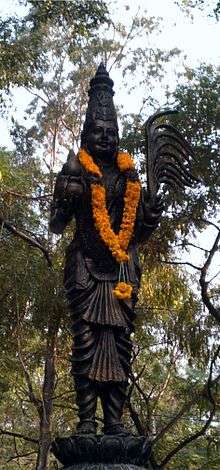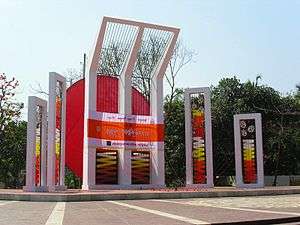Telugu language policy

Telugu language policy is an issue in the Indian state of Andhra Pradesh, where Telugu is the first language of 93 percent of the population. Telugu-language advocates note a lack of incentivisation and government support for the language, and press for their linguistic rights for Telugu's greater official in the recognition and promotion.
Present status
Instruction in Telugu as a subject at the primary, secondary and tertiary levels is not compulsory, and the medium of education need not be Telugu at the primary and secondary levels. This policy encourages English-language schools, and educated Telugu people are slowly losing their ability to read and write in Telugu. In some English-language schools, speaking in Telugu by students is punished.[1]
Telugu newspapers and periodicals are more popular than English-language newspapers by a 10:1 ratio. About 10 percent of English-educated people can comfortably read and understand English-language newspapers.
There are nearly 60 Telugu TV channels, covering issues and social needs of Telugus worldwide, and one English-language channel (CVR English) particularly aimed at the Telugu or Andhra Pradesh population. Although there are few national English-language channels in India, many international English channels have a viewership of less than two percent of the Telugu people or the Indian population. Telugu-language versions of channels such as Discovery and National Geographic are available in Andhra Pradesh.
Although the majority of their employees are Telugu, most correspondence from state- and central-government offices and businesses is in English. Telugu software is on the market, but English versions are used by state government offices and educational institutions. Court proceedings in the state are in English.
UNESCO has advised that the Telugu language might die over the next 15 years if the present policy of discouragement continues. The encouragement of English over Telugu has multiplied due to a perception that English-language facility is a key to upward mobility.[2] Despite India's many native languages, English protagonists are able to continue a British education policy after 65 years of independence.[3] For the last 30 years it has been believed that English-medium instruction ensures a bright future for young people, regardless of the quality of education.[4]
Many educated Telugu people began travelling around the world in search of knowledge-based jobs, and have observed that many countries are prospering faster than India by imparting education in their native languages without depending on English.[5] Throughout India, native-language advocates are demanding less reliance on English. An expenditure of less than one day’s gross domestic product (GDP) of Andhra Pradesh could achieve Telugu parity, if the state government is dedicated to Telugu-language development.[6] No country in the world has attained developed status without imparting education in its native language.
The evolution of English as an international language is an example of the English people’s love, dedication and untiring efforts to develop their language.[7] In the United Kingdom, Welsh (a minority language) is encouraged. The legal status of Welsh in the UK (spoken by about 750,000 people) is far better than the status of Telugu in India, where it is spoken by 85 million people.
Gandhi on educational medium
Throughout his life, Mahatma Gandhi advocated education in the mother tongue of the people. His trauma in being educated in English is typical of India today.[8] Gandhi said:
- "If I had the powers of a despot, I would today stop the tuition of our boys and girls through a foreign medium, and require all the teachers and professors on pain of dismissal to introduce the change forthwith. I would not wait for the preparation of text-books. They will follow the change. It is an evil that needs a summary remedy." (Young India, 1 September 1921)
- "The medium of instruction should be altered at once and at any cost, the provincial languages being given their rightful place. I would prefer temporary chaos in higher education to the criminal waste that is daily accumulating ... " (Harijan, 9 July 1938)
- "I must cling to my mother tongue as to my mother's breast, in spite of its shortcomings. It alone can give me the life-giving milk." (Harijan, 25 August 1946)
Telugu promotion
In 2012 the Andhra Pradesh official-language commission resumed its activities, and was tasked with organizing the fourth World Telugu Conference (WTC) after a 22-year hiatus. The conference was a success, with 5,000 Telugu delegates from all over the world meeting in Tirupati during the last week of December.[9] The WTC was inaugurated by the president of India, and the chief minister of Andhra Pradesh announced that every action needed will be implemented by the government to emphasize Telugu.
Implementations
- sory subject up to the 10th standard in the state beginning in the 2013-14 academic year.[10]
- All shop and business signs are to be written prominently in Telugu.[11]
- Teachers who punish students speaking Telugu on school premises will be sanctioned, with persistently-offending schools de-recognized.[12][13]
- Joining the World Unicode Consortium and developing a Unicode-based script for Telugu.[14]
- Official correspondence from the village to the state-secretariat level will be in Telugu, with all official documents signed in Telugu.[15]
- Annual statewide events, such as Telugu Language Day (celebrated on Gidugu Venkata Ramamoorty's birthday),[16] International Mother Tongue Day, Official Language Day,[17] and Charles Phillip Brown's birthday[18] to inspire Telugu-language development.
- ₹2 million to each district to promote Telugu language and culture in 2012–2013.[19]
- Greetingss and awards by the state government for encouraging correspondence in Telugu.
- All court proceedings and judgments, except for the High Court, will be in Telugu.[20][21]
- The state government proclaimed 2013 as Telugu Development Year.[22][23]
- The fifth WTC will be held in the US in 2017.[24]
Initiatives
- A ministry will be formed to promote Telugu,[25] translating books, expanding vocabulary and reviving Telugu fine arts and literature academies.[26] software requirement,[27]
- Preference for Telugu-medium students in state-government hiring[28]
Proposals

- All political parties in the state should support the Telugu language policy if elected to the state and central governments.
- Telugu visual and print media should conduct frequent discussions on Telugu language development involving representatives of all political parties in the state.
- Telugu typing should be taught in state high schools.
- Students up to the 12th standard who are studying in English should be able to write exams in Telugu or English and Telugu in all subjects except Telugu.
- Senior officials should speak in Telugu on duty as much as possible, with government-sponsored training programs to improve fluency.
- All elected members from the state shall take office of oath in Telugu.
- All call-centre and customer-care services catering to Indians shall have a Telugu-language option.
- The government of Andhra Pradesh shall maintain contact with the worldwide Telugu diaspora for guidance in developing the modern Telugu language.
Voluntary initiatives
Print and visual Telugu media have taken steps to reduce English in Telugu programs, using appropriate alternate Telugu words.[29] The Andhra Cricket Association has translated the National Cricket Academy's (NCA) coaching manuals into Telugu. Former India cricketer M. S. K. Prasad, director of cricket operations for the Andhra Cricket Association, was instrumental in the translation. He enlisted BCCI umpire Surapaneni Rama Krishna, who had translated the MCC Laws of Cricket into Telugu.[30]
See also
References
- ↑ "Girl caned for speaking Telugu in school". 9 March 2012. Retrieved 17 March 2013.
- ↑ "2 crore Indian children study in English-medium schools". 2 March 2012. Retrieved 17 March 2013.
- ↑ "UPSC notification put on hold". 15 March 2013. Retrieved 17 March 2013.
- ↑ "Myths about English". 2007. Retrieved 17 March 2013.
- ↑ "Plan to develop Telugu language". 2007. Retrieved 17 March 2013.
- ↑ "Action plan for full development of Telugu language". 2007. Retrieved 17 February 2013.
- ↑ "ఆంగ్ల భాష పురోగతిననుకరిద్దాం (Let us emulate English language progress)". Retrieved 17 February 2013.
- ↑ "Medium of Instruction, Gandhi Research Foundation". Retrieved 21 April 2013.
- ↑ "PM Manmohan Singh lauds Telugu people". 29 December 2012. Retrieved 17 March 2013.
- ↑ "Telugu to be compulsory in State schools". 29 January 2013. Retrieved 17 March 2013.
- ↑ "Shop signs must be in Telugu In Andhra Pradesh". 24 November 2012. Retrieved 17 March 2013.
- ↑ "Private schools warned against discouraging Telugu". 26 October 2012. Retrieved 17 March 2013.
- ↑ "It’s going to be Telugu ‘Velugu’ vs English-Vinglish". Retrieved 17 March 2013.
- ↑ "Telugu set to become world language". 9 September 2011. Retrieved 17 March 2013.
- ↑ "Officials appending signatures in Telugu". 7 February 2013. Retrieved 17 March 2013.
- ↑ "Celebrate Telugu language – Remembering Gidugu Ramamurthy.". 30 August 2012. Retrieved 17 March 2013.
- ↑ "May 14 is official language day in AP". 5-2-2013. Retrieved 17 March 2013. Check date values in:
|date=(help) - ↑ "Brown, father of modern day Telugu language". 2 November 2008. Retrieved 17 March 2013.
- ↑ "Efforts to promote Telugu language to get a fillip.". Retrieved 17 March 2013.
- ↑ "Chief Minister N Kiran Kumar Reddy endorses use of Telugu in judiciary". Retrieved 17 March 2013.
- ↑ "Stress on use of mother tongue in courts". 10 March 2013. Retrieved 17 March 2013.
- ↑ "2013 declared Telugu Development Year". Retrieved 27 March 2013.
- ↑ "Rs. 25 crore allocated for ‘Telugu Baata’". Retrieved 27 March 2013.
- ↑ "More plans on Telugu language promotion in the offing, says Buddha Prasad". 1 January 2013. Retrieved 17 March 2013.
- ↑ "Separate ministry to promote Telugu: CM". 28 December 2012. Retrieved 17 March 2013.
- ↑ "Plan to revive fine arts, literature academies: Buddha Prasad". 9 February 2013. Retrieved 17 March 2013.
- ↑ "CM gets award for success of Telugu conference held in USA". 18 February 2012. Retrieved 17 March 2013.
- ↑ "Weightage for Telugu medium students in govt jobs likely.". 2012-11-26. Retrieved 17 March 2013.
- ↑ "Telugu language slowly back on track in media". 2012-12-20. Retrieved 17 March 2013.
- ↑ "National Cricket Academy coaching manual in Telugu". 2012-07-30. Retrieved 17 March 2013.